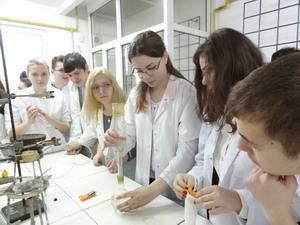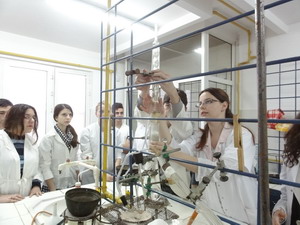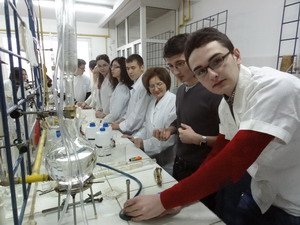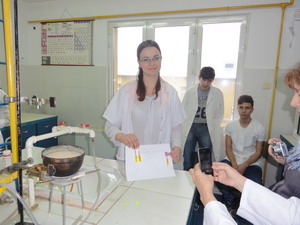In the context of the proposed activities included in one Romanian Unit entitled: “Nanosciences - A Facilitator Context for a United Collective”, the students are introduced to the concept of nanometals, trying to understand their specificity, and using green methods for obtaining some colloidal nanoparticles (Au and Ag) from plant extracts, synthesized also by them. The activities are conducted in interdisciplinary “research teams” who have the tasks to gain knowledge about nanometals and their applications in medicine, environmental protection, industry etc., raising so the importance of Science Education in their everyday life.
The teaching approach is based on students’ prior learning related to: extraction, chemical reactions, pH, salts and metal properties. On conducting the experiments, the students use plants which grow everywhere: in gardens, parks, common fields. Students are asked to make a documentation concerning the nanoparticles, and to identify applications of metal nanoparticles of Au and Ag in practice. Capitalizing the IBSE strategy and the 6E Model, the activities are organized and led, so that by their own effort, the students can discover / rediscover scientific facts or solve problem situations (common met in their everyday life), involving the use of metal nanoparticles of Au and Ag. The necessary materials and tools for the experimental procedures can be found easily in school laboratories.
The proposed Unit introduces a number of specific concepts that envisage RRI, covering:
1. Involvement - as people always stay interested and curious to discover and better understand the environment in which operate, the students act as “curious” and “open” to make research and development, constantly adding new facets of what they consider a priority for their needs.
2. Gender equality - students learn to treat with justice and fair all their colleagues (girls, partners, colleagues, potential invited persons etc.), proving tolerance, sensitivity to the raised problems - especially when working in groups. They learn to respect and strengthen the dignity of all around them, increasing their feminine colleagues to participate in experimental research.
3. Science education - the proposed scientific investigation related to the adopted strategies and work stages, requires a good knowledge related to techniques and working methods. In this respect, the students determine research objectives, identify problems and research trends. The experimental results (products) represent also a piece of their creative activity, the creative process being considered as a process of cognitive science research that meets the educational requirements and standards.
4. Accessibility - the students are aware that they have to start an innovative process without ignoring the fact that the result should be perceived and understood easily by all the interested people.
5. Ethics - to be a honest student researcher (for himself / herself and for others colleagues) represents a basic ethical principle. Dishonesty can lead to a wrong personal image not just for that person, but also for the whole research group.
6. Governance - a nation government plays an important role - in this case, it can fund the research into the benefits of humans (by investing in research related to new nanoparticles), but they can make efforts and provide laws to protect the citizens from the risks that they might have on their health. On the other hand, the students must be aware that a govern has to contribute on promoting any innovation that can provide progress of the nation, facilitating the effective cooperation between scientists and companies, in order to attract and select new scientific talents and harmonize the scientific excellence with social awareness and responsibility.












